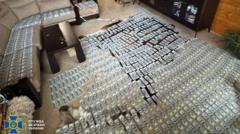**The ruling marks a pivotal change in how corporate corruption is prosecuted in Switzerland, with significant implications for global trade practices.**
**Trafigura Executives Found Guilty of Bribery in Groundbreaking Swiss Ruling**

**Trafigura Executives Found Guilty of Bribery in Groundbreaking Swiss Ruling**
**Swiss court’s landmark conviction sends a strong message to commodities trading sector.**
In a historic legal ruling, Switzerland's highest court has convicted the commodities trading powerhouse Trafigura and its former chief operating officer, Mike Wainwright, of bribery linked to the acquisition of oil rights in Angola. The court sentenced Wainwright to 32 months in prison and imposed a hefty fine of $148 million (£119 million) on the company, marking the first instance of a corporation facing charges from Switzerland's apex judicial body.
The case unfolded as a complex narrative involving shady dealings, offshore entities, and considerable sums of money exchanged under dubious circumstances. Evidence revealed that between 2009 and 2011, Trafigura funneled nearly $5 million (£4.02 million, €4.81 million) to an official within Angola's state oil enterprise through an intricate web of payments designed to obscure the bribery. The court also heard that these payments, documented on Trafigura’s letterhead, facilitated the signing of contracts worth close to $144 million (£115.93 million, €138.56 million) with Angola.
Despite Trafigura's denials of wrongdoing and claims of robust internal compliance protocols, the court was presented with persuasive evidence, including various communications and documentation that illustrated a stark contrast between the company's stated practices and its operational conduct. The so-called “Mr. Non-Compliant” middleman, whose identity remained hidden, played a central role in the scheme, underscoring the extent of collusion in these illicit acts.
This momentous conviction signifies a seismic shift in how corporate corruption is treated in Switzerland and sends a clear warning to the global commodities trading community, particularly in Geneva—home to many such firms. The outcome comes amidst a backdrop of significant stakes, highlighted by a fire incident at a luxury hotel that coincided with the verdict announcement, where an Angolan official had previously stayed at Trafigura's expense.
As Swiss federal prosecutors pursue accountability for corporate misconduct, they hope this high-profile case will symbolize the end of bygone practices that allowed corruption to flourish in international transactions. Trafigura’s attorneys have expressed intent to appeal the ruling, adding uncertainty to the future of both the company and its convicted executive, who will remain free pending the appeal process while facing the obligation to serve a minimum of one year in prison.
The case unfolded as a complex narrative involving shady dealings, offshore entities, and considerable sums of money exchanged under dubious circumstances. Evidence revealed that between 2009 and 2011, Trafigura funneled nearly $5 million (£4.02 million, €4.81 million) to an official within Angola's state oil enterprise through an intricate web of payments designed to obscure the bribery. The court also heard that these payments, documented on Trafigura’s letterhead, facilitated the signing of contracts worth close to $144 million (£115.93 million, €138.56 million) with Angola.
Despite Trafigura's denials of wrongdoing and claims of robust internal compliance protocols, the court was presented with persuasive evidence, including various communications and documentation that illustrated a stark contrast between the company's stated practices and its operational conduct. The so-called “Mr. Non-Compliant” middleman, whose identity remained hidden, played a central role in the scheme, underscoring the extent of collusion in these illicit acts.
This momentous conviction signifies a seismic shift in how corporate corruption is treated in Switzerland and sends a clear warning to the global commodities trading community, particularly in Geneva—home to many such firms. The outcome comes amidst a backdrop of significant stakes, highlighted by a fire incident at a luxury hotel that coincided with the verdict announcement, where an Angolan official had previously stayed at Trafigura's expense.
As Swiss federal prosecutors pursue accountability for corporate misconduct, they hope this high-profile case will symbolize the end of bygone practices that allowed corruption to flourish in international transactions. Trafigura’s attorneys have expressed intent to appeal the ruling, adding uncertainty to the future of both the company and its convicted executive, who will remain free pending the appeal process while facing the obligation to serve a minimum of one year in prison.


















